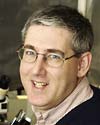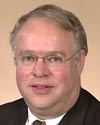The Board of Regents has named five faculty members to the Arthur F. Thurnau Professorship, an award that recognizes and rewards faculty for outstanding contributions to undergraduate education.
Those honored are: William Alexander, professor of English language and literature in LSA; H. Scott Fogler, Vennema Professor of Chemical Engineering and professor of chemical engineering in the College of Engineering (CoE); Richard Hume, professor of molecular, cellular and developmental biology, LSA; Dr. Timothy Johnson, Bates Professor of Diseases of Women and Children and professor of obstetrics and gynecology in the Medical School, and professor of women’s studies in LSA; and Yili Liu, associate professor of industrial and operations engineering, CoE.
Provost Paul N. Courant recommended the appointments, and the regents approved the nominations at the February meeting. The term of the professorship is July 1, 2003-June 30, 2006.
Established by the regents in 1988, the professorships are named after Arthur F. Thurnau, a U-M student in 1902–04, and are supported by the Thurnau Charitable Trust, which was established through his will. Recipients receive a grant to support their teaching.

Alexander’s “service to students, both in innovative courses like English 319 and English 310—community service courses in which he trains students to facilitate theater workshops in prisons, juvenile facilities and Detroit high schools —and outside the classroom in the Prison Creative Arts Project, is scholarly and admirable,” Courant said. “As an outstanding mentor and role model, he helps students to think about ways of connecting their intellectual life to a life of significant community action.”
Alexander was honored with the Amoco Good Teaching Award in 1982, and LSA presented him with the Excellence in Education Award in 1996. In 2001, his Prison Creative Arts Project was cited in the President’s Commission on the Undergraduate Experience as a model program for improving students’ civic education and engagement.

Fogler has helped train multiple generations of undergraduate chemical engineering students, Courant said. “He has a wide range of impressive accomplishments in the classroom, in the preparation of educational materials, in innovations, and in scholarly contributions related to teaching and learning,” Courant said. “An early-adopter of new teaching methods, he has familiarized himself with best practices and has implemented them in his teaching of the undergraduate chemical engineering course, Reaction Engineering and Design.”
Among his many awards and honors are the Excellence in Teaching Award presented by the Department of Chemical Engineering in 1993, and the Stephen S. Attwood Award for Excellence in Teaching and Research in 1995, the college’s most prestigious award given for extraordinary achievement in teaching, research, service and other activities. His textbook, “The Elements of Chemical Reaction Engineering,” is the dominant undergraduate text in this country and the rest of the world, Courant said.
As associate chair of curriculum in the formerly named Department of Biology, Hume spearheaded major initiatives aimed at reorganizing and improving the introductory biology sequence and the structure of the concentrations, Courant said. “He was the driving force

behind efforts to offer new project laboratory courses in neurobiology, microbiology and plant molecular biology to help undergraduate students gain valuable experience in laboratory research, and fostered the creation of new ‘hands-on’ research experiences for students interested in the life sciences,” Courant said. “In the recent past, he has made exceptional contributions to two of the most important undergraduate courses, Introductory Biology and Animal Physiology, and he has introduced two additional specialty courses for undergraduate students.”
In 1996, Hume was honored with LSA’s Excellence in Education Award for special contributions to the educational mission, excellence in teaching, curricular innovation and student supervision.
Johnson has become extensively involved in undergraduate education, even though his appointment in the Medical School does not require it, Courant said. “He has created and taught new courses that are at the cutting edge of their field,” Courant said. As co-instructor

of Women’s Reproductive Health, “he has received truly impressive evaluations from students,” Courant said. He also made “substantial contributions” as a member of the President’s Commission on the Undergraduate Experience, Courant said.
“An empathic listener, a thoughtful critic and a tireless advocate he gets excited about his students’ work,” the provost said.
Liu’s history of teaching evaluations “is remarkable and reflects not only on his teaching style and passion for his subject, but a deep respect and care for his students,” Courant said. His textbook, “An Introduction to Human Factors Engineering,” is one of the top two best-selling introductory human factors textbooks nationally and internationally. During his time as the Undergraduate Program Advisor, undergraduate enrollment has grown substantially, Courant said.

Liu has received many awards, including the Industrial and Operations Engineering Outstanding Teacher Award in 1994; the Alpha Pi MU Industrial and Operations Engineering Professor of the Year Award in 1995, 2000 and 2001; and the Outstanding Teacher Award in 1999 and 2001 from the CoE’s Society of Women Engineers/Society of Minority Engineering Students. In 2002, he was given the highly competitive Education Excellence Award from CoE for sustained excellence in curricular development, instruction and guidance at the undergraduate and graduate levels.

